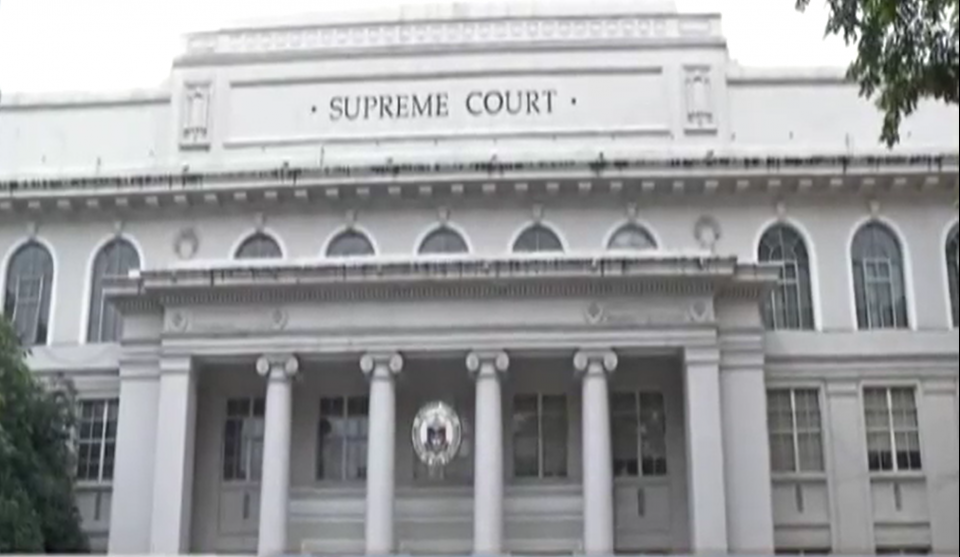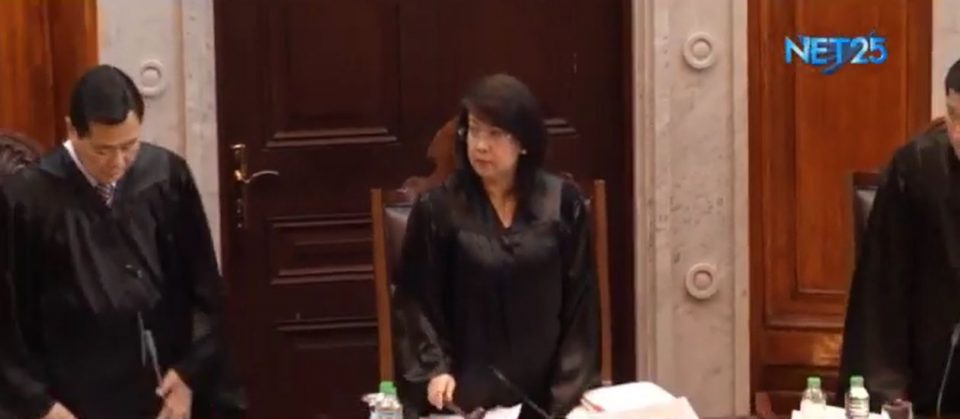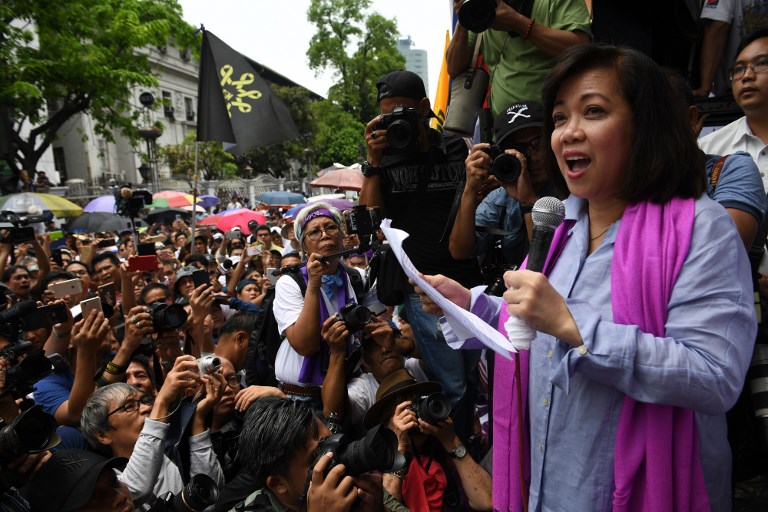
(Eagle News) — In a landmark ruling that has “far-reaching implications,” the Supreme Court said that impeachable government officials, including those appointed in office, are subject to review by the highest court of the land, especially those whose qualifications and eligibility are found to be lacking.
“This is an opportune time for this Court to exact accountability by examining whether there was been strict compliance with the legal and procedural requirements in the appointment of its Members,” said the Supreme Court’s majority decision, as penned by Associate Justice Noel Tijam, which ousted Maria Lourdes Sereno as Chief Justice.
“The Court’s action on the present petition has far-reaching implications, and it is paramount that the Court make definitive pronouncements on the issues herein presented for the guidance of the bench, Bar, and the public in future analogous cases,” it said.
The ruling that disqualified Sereno as Chief Justice invalidated former President Benigno Aquino III’s appointment of Sereno as head of the tribunal in August 2012.
The SC “disqualified” her from office after finding that she had failed to comply with the constitutional requirement of submitting complete Statements of Assets Liabilities and Net Worth.
The 153-page majority decision penned by Tijam was concurred in by seven other Associate Justices, while six others dissented constituting a vote of 8-6.
The SC ruling said that “the courts should be able to inquire into the validity of appointments even of impeachable officers.”

“To hold otherwise is to allow an absurd situation where the appointment of an impeachable officer cannot be questioned even when, for instance, he or she has been determined to be of foreign nationality, or, in offices where Bar membership is a qualification, when he or she fraudulently represented to be a member of the Bar,” it said.
The high court notes that in such a situation, “unless such an officer commits any of the grounds for impeachment and is actually impeached, he can continue discharging the functions of his office even when he is clearly disqualified from holding it.”
“Such would result in permitting unqualified and ineligible public officials to continue occupying key positions, exercising sovereign functions until they are successfully removed from office through impeachment. This could not have been the intent of the framers of the Constitution.”
It said that “public office is a public trust;” thus, the “people have the right to have only qualified individuals appointed to public office.”
“To construe Section 2, Article XI of the Constitution as proscribing quo warranto petition is to deprive the State of a remedy to correct a ‘public wrong’ arising from defective or void appointments,” it said.
“Ubi jus ibi remedium. Where there is a right, there must be a remedy.”

-SC says it can look into validity of CJ’s appointment –
With the decision, the Court said that it has jurisdiction over the Members of the Supreme Court, as well as other memebrs of the judiciary, based on the Constitution and other previous tribunal decisions.
“It is apparent that the instant petition is one of first impression and of paramount importance to the public in the sense that the qualification, eligibility and appointment of an incumbent Chief Justice, the highest official of the Judiciary, are being scrutinized through an action for quo warranto,” stated the SC decision that took on the quo warranto petition filed by the Office of the Solicitor General against Sereno.
The Supreme Court said that as can be gleaned from its recent decisions, the tribunal “has not hesitated from disciplining its members whether they be judges, Justices or regular court employees.”
“This Court has always been a vigilant advocate in ensuring that its members and employees continuously possess the highest ideals of integrity, honesty, and uprightness,” its majority ruling said.
“More than professional competence, this Court is cognizant of the reality that the strength of Our institution depends on the confidence reposed by Us by the public,” it stressed.
The majority decision said the case “should not therefore be treated merely with kid gloves because it involves the highest official of the judicial branch of the government.”
-Rejecting Sereno’s arguments-
The ruling rejected Sereno’s arguments that she can only be removed from office by impeachment.
Sereno, in her arguments, claimed that the Constitution does not allow the Supreme Court to oust her, being an impeachable official, or to decide on the invalidity or lack of qualifications of such impeachable officers.
In debunking Sereno’s arguments, the majority Court’s decision traced the history of the quo warranto and impeachment processes and concluded that the high court has the Constitutional and juridical power to oust an unqualified or erring Justice.
“An action for quo warranto, involves a judicial determination of the eligibility or validity of the election or appointment of a public official based on predetermined rules,” the SC explained.
An impeachment, on the other hand, is a proceeding exercised by the legislative “to vindicate the breach of trust reposed by the people in the hands of the public officer” by determining the officer’s “fitness to stay in office,” the high court’s majority ruling said.
-SC notes other quo warranto cases vs impeachable officers —
The SC also explained that it had, in fact, taken on quo warranto cases against impeachable officers, citing the quo warranto case filed by former President Joseph Estrada against former President Gloria Macapagal Arroyo who took over the presidency after the controversial EDSA 2 in 2001.
“This is not the first time that the Court took cognizance of a quo warranto petition against an impeachable officer. In the consolidated cases of Estrade v Desierto et al, and Estrada v Macapagal-Arroyo, the Court took cognizance and assumed jurisdiction over the quo warranto petition filed against respondents, who at the time of the filing of the petition had talken an oath and assumed the office of the President,” it said.
But it differentiated what a quo warranto proceeding for an elective official entails, from a quo warranto for an appointed official.
“In quo warranto proceedings referring to offices filled by election, what is to be determined is the eligibility of the candidates elected while in quo warranto proceedings referring to offices filled by appointment, what is determined is the legality of the appointment.”
-PET rules cited –
The Supreme Court’s majority decision also said it could not accept Sereno’s argument that, she being an impeachable official, could only be removed via impeachment.
“Following respondent’s (Sereno’s) theory that an impeachable officer can be removed only through impeachment means that a President or Vice-President against whom an election protest has been filed can demand for the dismissal of the protest on the ground that it can potentially cause his/her removal from office through a mode other than by impeachment,” the SC decision said.
“To sustain respondent’s position is to render election protests under the PET Rules nugatory,” the tribunal stressed.
The Supreme Court, acting as the Presidential Electoral Tribunal, is in charge and will decide on the electoral protest case filed by former Senator Ferdinand Marcos Jr., against Vice-President Maria Leonor “Leni” Robredo.
During Friday’s (May 11, 2018) en banc session, Sereno was ousted from her post as Chief Justice with a vote of 8-6.
Those who voted in favor of removing Sereno through the quo warranto petition were Associate Justices Diosdado Peralta, Teresita Leonardo De Castro, Lucas Bersamin, Samuel Martires, Francis Jardeleza, Alexander Gesmundo, Andres Reyes, and Noel Tijam who wrote the decision.
Those who dissented were Senior Associate Justice Antonio Carpio, and Associate Justices Marvic Leonen, Mark del Castillo, Alfredo Benjamin Caguioa, Presbitero Velasco Jr., and Estela Perlas-Bernabe.
The high court’s decision was “immediately executory.”
(Eagle News Service)







